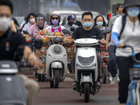China ramped up crude oil imports from Russia in May, customs data showed Monday, helping to offset losses from Western nations scaling back Russian energy purchases over the invasion of Ukraine.
 Full Story
Full Story
Unions and train companies in Britain are set to hold last-minute talks Monday amid fading hopes of averting the country's biggest rail strikes for decades.
Up to 40,000 cleaners, signalers, maintenance workers and station staff are due to walk out for three days this week, on Tuesday, Thursday and Saturday, in a dispute over pay and job security at a time of soaring inflation.
 Full Story
Full Story
Weeks of negotiations on safe corridors to get grain out of Ukraine's Black Sea ports have made little progress, with urgency rising as the summer harvest season arrives.
Countries like Lebanon, Somalia, Libya, Egypt and Sudan are heavily reliant on wheat, corn and sunflower oil from Ukraine and Russia.
 Full Story
Full Story
At a gas station near the Cologne, Germany, airport, Bernd Mueller watches the digits quickly climb on the pump: 22 euros ($23), 23 euros, 24 euros. The numbers showing how much gasoline he's getting rise, too. But much more slowly. Painfully slowly.
"I'm getting rid of my car this October, November," said Mueller, 80. "I'm retired, and then there's gas and all that. At some point, you've got to scale back."
 Full Story
Full Story
Germany will take emergency measures to ensure it meets its energy needs after the drop in supply of Russian gas, including increased use of coal, the government said Sunday.
 Full Story
Full Story
The Universal Postal Union has published on its website a LibanPost statement about the company’s efforts to achieve the U.N.’s Sustainable Development Goal 8 (Decent Work and Economic Growth).
Below is the statement’s full text as published by UPU:
 Full Story
Full Story
China on Friday defended its tough "zero-COVID" policy after the U.S. ambassador said it was causing serious damage to the global economy and foreign business sentiment.
Foreign Ministry spokesperson Wang Wenbin said the Chinese economy is recovering from the effects of the pandemic and "facts prove" the policy mandating lockdowns, quarantines and mass testing is "suitable for China's national conditions and has stood the test of history."
 Full Story
Full Story
Russia reduced natural gas to Europe again Friday, including cutting flows by half to Italy and Slovakia and completely to France, as countries have worked to ease their dependence on Russian supplies amid the war in Ukraine.
It marks the third day of significant reductions to the fuel that powers industry and generates electricity in Europe, which also have hit Germany and Austria. It has further spiked already-high energy prices that are driving record inflation in the European Union.
 Full Story
Full Story
After all-night talks, members of the World Trade Organization early Friday reached a string of deals and commitments aimed to limit overfishing, broaden production of COVID-19 vaccines in the developing world, improve food security and reform a 27-year-old trade body that has been back on its heels in recent years.
WTO Director-General Nzogi Okonjo-Iweala, after a pair of sleepless nights in rugged negotiations, concluded the WTO's first ministerial conference in 4-1/2 years by trumpeting a new sense of cooperation at a time when the world faces crises like Russia's war in Ukraine and a once-in-a-century pandemic that has taken millions of lives.
 Full Story
Full Story
Germany's vice chancellor is stepping up an appeal for the country's residents to save energy after Russia's Gazprom announced significant cuts in natural gas deliveries through a key pipeline.
State-owned Gazprom announced on Tuesday that it was cutting gas flows through the undersea Nord Stream 1 pipeline to Germany by 40%, then, a day later, announced a further cut that brings the overall reduction to about 60%.
 Full Story
Full Story



